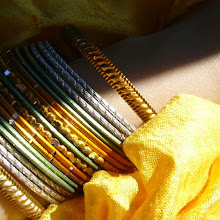A third into Ship of Theseus I had decided that I will not be blogging about it. Two thirds in, I was almost regretting trading my trip to the gym for a trip to see it. And then the last scene happened. And it all came together. And I thought: "Ha! Ok, now that's cool!". But I was still not going to write about it. And then something weird happened: I kept thinking about it the entire way home and well into the evening. Then I started talking about it at home. And, well, here I am... Hi blog friends!!!
I saw Ship of Theseus at an advance screening before its premiere at the Toronto International Film Festival next week. And you all know how much I love TIFF, the festival that never fails to bring something to talk about on this blog. Even more so this year when there is an entire section dedicated to Mumbai filmmakers: City to City! That link, by the way, was just to make you all jealous, I won't be able to see every one of those movies, though I will try for as many as possible. Keep your fingers crossed for me to also get tickets for Midnight's Children and English Vinglish! I will need all the good karma you can send me. But back to our Ship!
Since I got one in my press kit (by the way, this is so exciting, I never got a press kit before!), here's the official synopsis:
An unusual photographer grapples with the loss of her intuitive brilliance as an aftermath of a clinical procedure. An erudite monk, confronting an ethical dilemma with a long held ideology, has to choose between principle and death. And a young stock broker, following the trail of a stolen kidney, learns how intricate morality can be. Following the separate strands of their philosophical journeys, and their eventual convergence, Ship of Theseus explores questions of identity, justice, beauty, meaning and death.
So why did I not want to write about it, you will ask. It's not that it's badly made. On the contrary, it's fabulously scripted, very well acted, and brilliantly shot. But it commits one unpardonable sin: it draaaaaags! It's almost as if the director forgot to say "cut" after every scene. So you find yourself "getting it" and then having to sit through another minute of imagery just to wrap it up. It gets tiring. I also think the film would have benefited from running the stories in parallel instead of one after the other. Even if the ideas didn't overlap (though they could have), at least we would have had a sense of cohesion throughout the film rather than feeling like we're watching three 45-minute films. But hey, we were told that there is editing still to be done, so maybe those of you watching this at TIFF will wonder what the hell I was talking about... I sincerely hope you will!
So forget all that. The content more than makes up for the lack of editing. If Ship of Theseus were a mockumentary it would begin like this: "You think you know about [insert theme]... But you have no idea!". Just kidding. But there's some truth to that. What the three stories do is take one theme (and I won't mention it because I want you all to suffer like I did until you figure it out mwahahaha!) and look at it, not from 2 antithetic points of view, but from six. Actually, seven.
Each story has two characters that are at opposite ends of the debate, each presenting an excellent string of arguments, with a seventh one thrown in at the end of the third story, adding the economic dimension (read: money). As their ideologies battle each other, the viewer gets to ponder on more than just who's right and who's wrong, a trivial question anyway. We're left analysing our own ideologies and the compromises we make.
Most of these characters are idealists: Maitreya (Neeraj Kabi), the monk, is so obstinate in his pledge for non-violence that he is willing to sacrifice his own life rather than support the pharmaceutical industry. But if you believe that you can make a difference in the positive through your fight, how much of a difference will you make in the negative by giving it up? Are your principles more important than yourself or do they end with the self? And while we're at it, what is the self anyway? A question that will keep coming back throughout the film, as expected from the title.
If Ship of Theseus were a book, this section would be the most highlighted because each line of dialogue carries some philosophical weight. Very little happens in this story, but much is talked about and every line is worth thinking about. The conversation goes from the importance of all living matter in the world to the effect that micro-organisms have on our actions and the debate is fascinating to say the least. Not many movies make me wish I could take notes, but this section sure did.
Aaliya (Aida El-Kashef), the photographer, is so passionate about her art that she follows it against every obstacle fate throws at her. She manages to create a laboratory of tools that make up for her eye-sight to the point where it seems that they also replace her craft. But when her eye-sight is restored and she doesn't need those crutches anymore she starts to doubt her own talent: how much did the tools facilitate and how much did they create? My favourite scene of the film is Aaliya in the middle of a busy intersection trying to take pictures and being assaulted by the noise, the commotion, the colours, the movement, the "subjects". The images go by at different speeds and we can really feel her confusion, her frustration, her helplessness because we're made to experience it ourselves. An excellent sample of the filmmaker's talent this scene (and the cinematographer's, for sure).
Aaliya's story reminded me of Luciano de Crescenzo's thoughts on the philosphy of Marsilio Ficino. To summarize it, de Crescenzo concludes that the human soul was built to fight against the hardships of life much like the propeller of a motorboat was built to work against the resistance of the water. Taking away the hardships is like taking away the water: it will break the engine.
Finally, the most eventful story, sees Navin (Sohum Shah), investigating the value of honesty. His preoccupation (obsession even?) with making things right leads him all the way across the world in what many would call a wild goose chase. Between lovely shots of Stockholm and heavy conversations, more questions arise: How much does ignorance excuse? Is there a best way to make amends for injustice? And last but not least: how much do principles weigh in money?
Of course the best part of the film is the last scene that reunites the three tracks and adds yet another layer to the story. But I won't spoil that for you.
I wanted to end this review with a word on the actors and a word on the cinematography, but I realize that other than finding fifty synonyms for brilliant, I can't do much else. There's a scene in the beginning of the movie where the camera closes in on a caterpillar crossing a busy corridor and we see dozens of shoes stepping around it, most of them a few centimeters shy of squashing it, though none does. That was the moment when I sank into my chair and thought: oooh, at least it's gonna be a pretty one! Luckily, it was more than just a pretty one!
To keep this in Ancient Greece territory, Ship of Theseus is like reading Plato's Dialogues: you're not there for what happens necessarily, you're there because of the questions it raises and because it makes you think about things you thought you knew in different ways. From this point of view Ship of Theseus is a fabulous experiment, one not to be missed, so here's hoping all the editing issues get resolved for its big debut at TIFF!
Ship of Theseus (2012, English, Hindi, Arabic, Swedish)
Director: Anand Gandhi
Starring: Sohum Shah, Aida El-Kashef, Neeraj Kabi
Director of Photography: Pankaj Kumar
2 months ago





